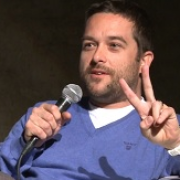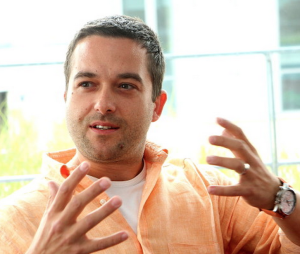This week, StartupYard investor and VC, Ondrej Bartos, of Credo Ventures answered some of my questions on venture capital investing, and dealing with early stage startups. Ondrej has recently been cited as one of the top European investors in technology by Nibletz.com, and is a mentor at Startupyard. Here’s what he had to say.
Hi Ondrej, can you tell us a bit about how you got involved with Startupyard?
I first got involved as a mentor back when Lukas and Petr founded SY in 2011, and after the first year we decided as Credo Ventures to become an investor and shareholder, as we felt that SY was very well-positioned to support the startup ecosystem in Central Europe which is something we as a venture firm very much hope for and is crucial for our business. So in 2012 we became a very active investor, we supported SY to get into GAN, to extend its mentor group, and to get funding for the following classes. And it’s been great fun as well as inspiration working with both the SY team and the accelerated startups.
You’ve been a VC for a long time. Can you talk a bit about your career, and how the field has changed during your tenure?
Hey, it hasn’t been such a long time… 🙂 I actually first started as a small angel investor, then I worked for a Polish VC MCI Management, but I only co-founded Credo in 2009 – and that’s what I consider the real start of my VC career. I did make some nice venture deals in my MCI days, like Geewa for which we then hired Cedric as a CEO [
Cedric Maloux is now
CEO of Startupyard] or Nostromo which was a terrible failure due to Mr. Jobs’ genius move with the iPhone. I made successful investments like Retail Info (sold to Mafra) or Invia.cz (which still is the largest online travel commerce player in Central Europe). But only with Credo I really started focusing on what my passion is: seeking and backing the future global stars, the innovators and disruptors who aim to create from scratch something which can change people’s lives.
In the world of startups, I think 5 years may seem like a very long time to some people. Are you settled into this new role, or do you dream of even bigger things?
Stay hungry, of course I dream. I dream of Credo fund 2 and 3 and 4… I dream of another billion-dollar-company from Central Europe, backed by Credo. I dream of a Czech startup solving world’s poverty or schizophrenia.
What about Credo Ventures (your VC firm)? Why did you decide to found it, and what’s your overall mission?
As already said, my passion are entrepreneurs who aim to disrupt ways markets operate now, with the use of technology which is our main sector focus. We consider venture capital is that it’s a tool to help the smartest and most capable entrepreneurs to make their dreams happen. We are not financiers, we are backers of entrepreneurs. And we are entrepreneurs ourselves.
How has the environment in Central Europe changed for VCs in the in the past 5 years? Good changes, bad changes? How does the tech business here stack up against bigger markets?
This really depends on the point of view. You could say the environment hasn’t changed too much, we as VCs still receive only a couple of hundred projects per year, most of which are really low quality (and I’m being diplomatic here), we still have to explain what we seek in projects and what we look for in entrepreneurs, people generally still don’t understand the basics (of our business), people still don’t understand what startups are (even the ones who claim to be startups). On the other hand, comparing to the situation 5 years ago, we have a NYSE traded tech company AVG from the Czech Republic which attacks $1B market cap, we have a NASDAQ traded company LogMeIn from Hungary which attacks $1B market cap. We have another $1B security company Avast which recently announced investment from CVC Capital Partners. We saw successful exits of local startups Cognitive Security (which we happened to be an investor in) to Cisco Systems or Mdot to GoDaddy. The number of projects we saw in 2010 was a third of what we saw in 2013 (550 projects). There are a number of accelerators and incubators, foreign VCs are looking around and finally are willing to invest into Central European startups – we have coinvested with Atlas, Index, Flybridge, Baseline and other U.S.- and UK-based funds. I am very optimistic…
If you’re comfortable talking about it, what was your all-time biggest mistake as an investor, or as an entrepreneur? The more apocalyptic, the better.
The most apocalyptic one I will skip, sorry. Maybe in a couple of years…
I will say Nostromo was certainly one of them. It was a great team, great entrepreneurs, solid product and vision… if only Steve Jobs didn’t introduce iPhone and change mobile telephony forever. We made the investment at a time when analysts and researchers predicted something totally different than what actually then happened. $1M down the drain, nothing worse, no apocalypse.
I think startupers do live in fear that Google or Apple or Facebook will introduce a small change (like an added functionality) that will dash their dreams to peaces. Whole businesses have been made obsolete by big players this way. Is that happening more, or is the playing field just getting wider for new ideas? Can you tell us a little more about Nostromo?
Well, when you’re a startup there’s always a risk of someone huge with deep pockets and 64 billion dollars in the bank will launch a product or service which would make you irrelevant. It happens. But I wouldn’t say it happens more often. Also, startups should be carefully not to base the whole business on just a feature addable by Google or Facebook.
About Nostromo… well it was a startup in the pre-iPhone era, mobile phones were dump phones and the only way people could personalize them was through purchases of logos, ringtones, wallpapers and games, mostly through specialized portals and mobile carriers. Nostromo was a producer of such personalization premium branded content, after we invested in 2006 they acquired some big brands like Garfield, TNMT or Kung Fu Panda, started distribute them globally. In 2007 the iPhone came. In 2009 the market which according to analysts’ reports in 2006 was supposed to grow rapidly, was dead. Simple and quick as that.
What are a couple of things startups are most often not prepared for when they meet you, and start talking to your about their products and their future?
In general I must say that startups come to us better prepared than a couple of years back – which could mean that startup founders in Central Europe have more access to information and lessons learnt from other startups from around the world, and are becoming more aware of the whole startup investing thing. On the other hand there are always things to improve – in general I would say that the most common mistake would be insufficient understanding of competition and customers. Who is solving the same problem and how, and who should be buying/using the product, what exactly is the motivation, what is solving the problem now…
What kinds of things can really turn you off from a potential investment? How much does personality matter in the founders, or is it all about the business?
It is all about people! And there are tons of things that turn me off – crazy ambitions, lack of ambitions, inability to listen, lack of knowledge of the target market, laziness, and the list could go on…
Some people are scared of VCs. Are there any good reasons to be wary of dealing with many of them?
There is no rational reason to be scared of VCs, or at least no more than being scared of swimmers. Of course, you need to be aware that venture capital is not for everybody, and it could be uncomfortable for an entrepreneur who doesn’t have the ambition to grow rapidly or change the world, due to unaligned interests. So if you want to create a lifestyle business with organic growth generating steady income, don’t go to VCs. VCs just can be scary as they often provide very direct and brutal feedback, but again – mostly for the ones who don’t want to hear feedback.
What are some things founders are often preoccupied with, but which don’t matter as much as they think?
As cliché and banal this may sound, very often founders are in love with their product or offering, and they spend way too much time on brushing it and playing with it without having any feedback from customers. Then they release their polished product to the market and often realize that it doesn’t solve any problem and there are no customers who would want to pay for the product, or even use it at all – so they spent a lot of time and energy on a beautiful useless product. Just to be clear, we love founders who are passionate about the product – but the passion has to be about the problem–solving attributes of the product, not the product itself.
What’s the best pitch you’ve ever heard, and what made it so great?
Before I answer this, I would just like to remind that a great pitch doesn’t mean it’s a great company and vice versa – I’ve heard really bad pitches from founders who ended up being super successful and I saw an awesome pitch by an entrepreneur who failed badly. When you think about it, pitching is really very much like the sports in which judges make calls – impossible to measure, it is about subjective opinions and feelings – some people feel Sarka Pancochova should have won the olympic medal, judges thought otherwise… But the last pitch I’ve heard was actually from a team we decided to invest in – and it will be announced soon, so I won’t tell you the name. But it was a pitch which gives you goose bumps because you feel this is something potentially world changing. As my colleague Andrej says, that’s the feeling to be a VC for – BTW, I would highly recommend
Andrej’s blog, it is great for startup founders who are considering coming to us for funding – it gives them a great recipe.
What are 5 things you want a company to have accomplished before you consider investing?b
Well, there’s pretty much just 1 thing to accomplish: convince us that we should invest. But seriously, we want the founders to convince us on the existence of a problem or pain in the market, show us big enough potential in solving that problem, explain us what the solution is, build a strong and committed team and ideally show us some initial traction proving their point and ability to execute. Not difficult, ay? 🙂
We got some push-back, even from locals, when we declared that Prague was the best new place to start a company and run a startup. How do you see Prague’s future as a cradle of innovation?
Prague is an awesome place, both to run a startup and to live in… 🙂 You can change the world no matter where you’re based. Although it is still the case that for some startups you should at least have access and exposure in places like Silicon Valley, but you can still base your startup anywhere else.
[ssba]



